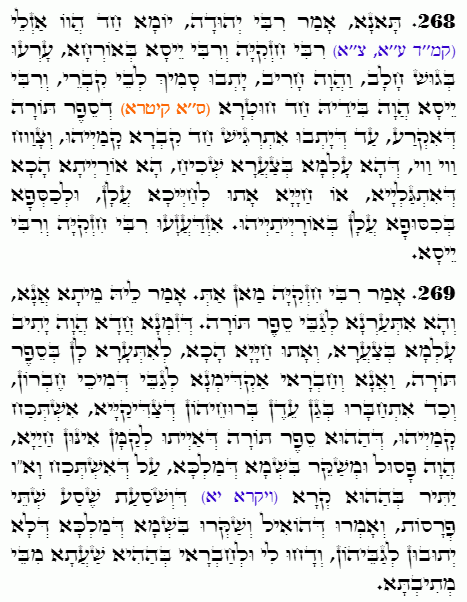Daily Zohar # 4666 – Acharei Mot – One extra letter and we are rejected
Daily Zohar 4666

Hebrew translation:
269. אָמַר רַבִּי חִזְקִיָּה, מִי אַתָּה? אָמַר לוֹ: אֲנִי מֵת, וַהֲרֵי הִתְעוֹרַרְתִּי לְסֵפֶר הַתּוֹרָה. שֶׁפַּעַם אַחַת הָיָה הָעוֹלָם יוֹשֵׁב בְּצַעַר, וּבָאוּ לְכָאן הַחַיִּים לְעוֹרֵר אוֹתָנוּ עִם סֵפֶר תּוֹרָה, וַאֲנִי וַחֲבֵרַי הִקְדַּמְנוּ אֶל יְשֵׁנֵי חֶבְרוֹן, וּכְשֶׁהִתְחַבְּרוּ בְּגַן עֵדֶן עִם רוּחוֹת הַצַּדִּיקִים, נִמְצָא לִפְנֵיהֶם, שֶׁאוֹתוֹ סֵפֶר תּוֹרָה שֶׁהֵבִיאוּ לְפָנֵינוּ אוֹתָם הַחַיִּים הָיָה פָּסוּל וּמְשַׁקֵּר בְּשֵׁם הַמֶּלֶךְ, עַל שֶׁנִּמְצְאָה וָא”ו יְתֵרָה בְּאוֹתוֹ פָּסוּק שֶׁל (ויקרא יא) וְשֹׁסַעַת שֶׁסַע שְׁתֵּי פְרָסוֹת. וְאָמְרוּ, שֶׁהוֹאִיל וְשִׁקְּרוּ בְשֵׁם הַמֶּלֶךְ, שֶׁלֹּא יָשׁוּבוּ אֲלֵיהֶם, וְדָחוּ אוֹתִי וְאֶת הַחֲבֵרִים שֶׁלִּי מִבֵּית הַיְשִׁיבָה.
.
Zohar Acharei Mot
Continued from previous DZ
#268
We have learned that Rabbi Yehuda said: One day, Rabbi Ḥizkiyah and Rabbi Yesa were walking along the way. They arrived at a place called Gush Ḥalav, which was desolate. They sat near a cemetery, and Rabbi Yesa had with him a torn piece of a Torah scroll—that is, he was holding a torn section of a Torah scroll with a column of text.
A grave before them shook as they sat and cried out, “Woe, woe! The world is in distress because the Torah has been exiled to this place. Or perhaps the living have come to mock us and disgrace us with shame using their Torah.”
Rabbi Ḥizkiyah and Rabbi Yesa were startled.
#269
Rabbi Ḥizkiyah said to the grave, “Who are you?”
He replied to him, “I am a dead person, and I have been awakened because of the Torah scroll. Once, the world was in distress, and the living came here to awaken us with a Torah scroll. My companions and I went ahead to the sleepers of Hebron (the Patriarchs). When they gathered in the Garden of Eden with the soul of the Tzadikim on the level of Ruach, it was found among them that the Torah scroll that the living had brought before us was invalid and falsified the name of the King. This was because an extra ‘vav’ was found in the verse ‘וְשֹׁסַעַת שֶׁסַע שְׁתֵּי פְרָסוֹת’ where it was written ‘‘וְשֹׁסַעַת’. They said, ‘Since they have lied in the name of the King—for the Torah is the name of the King—they shall not return to them to inform them whether their prayer was accepted. Because of this, they expelled me and my friends from the study hall at that time.
Notes:
Rabbi Yehuda recounts an incident in which the world was in distress, and the living came to the cemetery to awaken the souls of the Tzadikim by bringing a Torah scroll. Motivated by this, he and his companions proceeded to inform the “sleepers of Hebron,” referring to the Patriarchs Abraham, Isaac, and Jacob.
When they gathered in the Garden of Eden with the spirits (Ruchot) of the Tzadikim, it was discovered that the Torah scroll brought by the living was invalid because it contained an error—an extra letter ‘vav’ in a specific verse. The verse in question is about animals that are permitted to be eaten, specifically mentioning those that “divide the hoof completely” (Deuteronomy 14:7). The incorrect addition altered the word “shasa” (שָׁסַע), meaning “split,” to “ve’shasa” (ושָׁסַע), introducing an unnecessary conjunction ‘and.’
This mistake was considered a falsification of the “name of the King,” symbolizing YHVH because the Torah is viewed as embodying Hashem’s name and essence. As a result, the Tzadikim declared they would not return to the living to inform them whether their prayers had been accepted. Moreover, the speaker and his friends were expelled from the heavenly study hall (Yeshiva) due to this misrepresentation.
This Zohar section teaches about the critical importance of maintaining the purity and accuracy of the Torah. An error seemingly as small as an extra letter is considered a serious breach that can disrupt the connection between the living and the spiritual realms. It serves as a cautionary tale about the diligence required in religious observance and the profound effects that actions in this world can have on both the living and the departed. The narrative emphasizes that the sanctity of Torah texts must be preserved to maintain harmony between earthly practices and heavenly decrees.
{||}

 Previous: Acharei Mot
Previous: Acharei Mot

